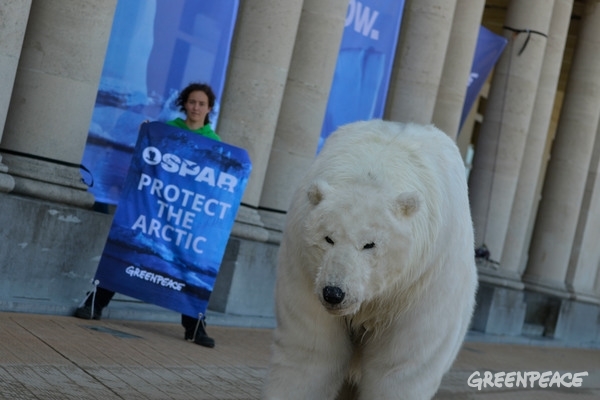“Amazing Iceberg Concert" for Arctic protection
Open Sustainability & Creativity
“Amazing Iceberg Concert" for Arctic protection
By Pianist Ludovico Einaudi & Greenpeace
Through his music, acclaimed Italian composer and pianist Ludovico Einaudi has added his voice to those of eight million people from across the world demanding protection for the Arctic. Einaudi performed one of his own compositions on a floating platform in the middle of the Ocean, against the backdrop of the Wahlenbergbreen glacier (in Svalbard, Norway).
The beauty of the Arctic is overwhelming. The cold, the silence and
extraordinary sounds as the ice creaks, rumbles and falls. The pristine
environment, with life popping out to welcome you when you least expect
it. A unique place that people across the world want to protect.
Greenpeace enlisted pianist and composer Ludovico Einaudi to play a
unique concert on a floating platform in the Arctic Ocean to help call
for further protection of the endangered region.
"The Arctic is one of the most unique places on Earth. It spans eight countries, is home to more than 13 million people, and provides a habitat for truly incredible wildlife. And now, it’s the battleground for one of the most important fights in environmental history. " Greenpeace
Two weeks ago the Greenpeace ship Arctic Sunrise set off
from the Netherlands carrying a very special load: the voices of eight
million people. Messages from around the globe calling for governments
to save the Arctic from threats such as oil drilling and destructive
fishing.
Here are a few of the reasons why:
- For its unique wildlife, including polar bears, narwhals and Arctic foxes
- For future generations
- Because it regulates the climate
- Because it is a global treasure worth protecting from corporate greed
Ludovico Einaudi has turned eight million voices into music, Elegy for the Arctic, specially composed to help protect what we love. As he performed this piece for the first time — in front of a magnificent surging glacier — the music echoed across the ice, a moment that will remain in our minds forever.
More information on:
SAVE THE ARCTIC! & GREENPEACE

LUDOVICO EINAUDI
Ludovico
Einaudi OMRI (Italian: [ludoˈviːko eiˈnaudi]; born 23 November 1955) is
an Italian pianist and composer. He trained at the Conservatorio Verdi
in Milan and under composer Luciano Berio in the early 1980s. Einaudi
began his career as a classical composer, and soon began incorporating
other styles and genres—including pop, rock, world music, and folk
music.
Einaudi composed the scores for a number of films and trailers, including The Intouchables and I'm Still Here, the TV miniseries Doctor Zhivago, and Acquario in 1996, for which he won the Grolla d'oro for best soundtrack. He has also released a number of solo albums of piano and orchestra, notably I Giorni in 2001, Nightbook in 2009, and In a Time Lapse in 2013. Taranta Project, a collaborative album, was released in May 2015, and Elements was released in October 2015.
Einaudi composed the scores for a number of films and trailers, including The Intouchables and I'm Still Here, the TV miniseries Doctor Zhivago, and Acquario in 1996, for which he won the Grolla d'oro for best soundtrack. He has also released a number of solo albums of piano and orchestra, notably I Giorni in 2001, Nightbook in 2009, and In a Time Lapse in 2013. Taranta Project, a collaborative album, was released in May 2015, and Elements was released in October 2015.
“What affects her community affects my community, what affects us affects them. When one nation loses the right to subsist on their own foods, it affects all of us.”
Faith Gemmill-Fredson, Native Alaskan and founder of REDOIL (Resisting Environmental Destruction On Indigenous Lands)
Protecting the Arctic

It’s About Climate Change
The Arctic plays a critical role in regulating global temperatures and counteracting climate change.
Here’s how it works: Arctic sea ice keeps the planet cool by reflecting sunlight. As climate change takes hold and the world gets warmer, the ice is melting and the oceans are absorbing sunlight. This makes the planet even warmer, causing the ice to melt even faster.
As the Arctic ice melts, the oil under Arctic waters becomes an increasingly attractive target for the oil industry. That’s right—oil that was once out of reach because the Arctic was frozen is now accessible because of climate change. And the very companies responsible for climate change want more oil to make climate change worse.
The Arctic plays a critical role in regulating global temperatures and counteracting climate change.
Here’s how it works: Arctic sea ice keeps the planet cool by reflecting sunlight. As climate change takes hold and the world gets warmer, the ice is melting and the oceans are absorbing sunlight. This makes the planet even warmer, causing the ice to melt even faster.
As the Arctic ice melts, the oil under Arctic waters becomes an increasingly attractive target for the oil industry. That’s right—oil that was once out of reach because the Arctic was frozen is now accessible because of climate change. And the very companies responsible for climate change want more oil to make climate change worse.
It’s About People
Threats to the Arctic are threats to the 4 million people who live there, particularly indigenous groups. These communities depend on this environment for food and resources and have stewarded it for centuries.
The Arctic is home to more than 40 distinct ethnic and cultural groups. As it changes, so does the land of their heritage, languages and way of life. An oil spill in the region would amount to nothing less than a humanitarian crisis.
It’s About Wildlife
The Arctic is home to incredible animals found nowhere else in the world. All of them depend on sea ice to survive.
The amazing land animals that call the Arctic home include polar bears, foxes, reindeer and oxen, many of which are endangered. In fact, experts warn that polar bears could completely disappear from the Arctic in the next 100 years if we don’t take action soon.
And there are equally wonderful creatures living in Arctic waters. Numerous whale species, seals and walruses can only be found in the Arctic.
The Arctic is home to incredible animals found nowhere else in the world. All of them depend on sea ice to survive.
The amazing land animals that call the Arctic home include polar bears, foxes, reindeer and oxen, many of which are endangered. In fact, experts warn that polar bears could completely disappear from the Arctic in the next 100 years if we don’t take action soon.
And there are equally wonderful creatures living in Arctic waters. Numerous whale species, seals and walruses can only be found in the Arctic.
CAMPAINGN SAVE THE ARCTIC

The Arctic is melting faster and faster. Over 7.5 million people from all over the world have already raised their voices to call for its protection. Because of its biodiversity, because the Arctic regulates the weather of our entire planet and because we should preserve it for future generations. These are just some of the reasons we need to protect it. But there are so many more.
"We have a chance to achieve a protected area within the international waters of the Arctic Ocean. Help us make it happen. Save the Arctic!" Greenpeace
The best way to protect the Arctic Ocean, its wildlife and its people is to keep fossil fuels in the ground. This means telling all companies and governments that the Arctic Ocean—and its oil—is off limits forever.
More information on:
SAVE THE ARCTIC! & GREENPEACE
The timing of Einaudi’s performance is not by chance. This week, delegates at the OSPAR Commission meeting in Tenerife, Spain, have an opportunity to take an important step in protecting the Arctic. The proposal before them would safeguard 10% of the Arctic ocean, an area roughly the size of the UK.
And it is urgent. The Arctic ocean is the least protected sea in the world, its high seas currently have no legal safeguards. As the ice cover decreases with rising temperatures, this unique area is losing its frozen shield, leaving it exposed to reckless exploitation, destructive fishing trawlers and risky oil drilling.
The OSPAR Commission has a mandate to protect the marine environment of the northeast Atlantic, including part of the Arctic ocean. But three countries, Norway, Denmark and Iceland, who are listening to corporate interests, are keen to stop that from happening.
And it is urgent. The Arctic ocean is the least protected sea in the world, its high seas currently have no legal safeguards. As the ice cover decreases with rising temperatures, this unique area is losing its frozen shield, leaving it exposed to reckless exploitation, destructive fishing trawlers and risky oil drilling.
The OSPAR Commission has a mandate to protect the marine environment of the northeast Atlantic, including part of the Arctic ocean. But three countries, Norway, Denmark and Iceland, who are listening to corporate interests, are keen to stop that from happening.

SOURCE:
Ludovico Einaudi performs with 8 million voices to save the Arctic via Greenpeace
by Elvira Jiménez and Erlend Tellnes
greenpeace.org/Ludovico-Einaudi
greenpeace.org/usa/arctiC
"No Copyright Infringement Intended, Strictly For Promotional Purposes Only! All Rights Reserved To Their Respective Owners."
"Copyright Disclaimer Under Section 107 of the Copyright Act 1976, allowance is made for "fair use" for purposes such as criticism, comment, news reporting, teaching, scholarship, and research. Fair use is a use permitted by copyright statute that might otherwise be infringing. Non-profit, educational or personal use tips the balance in favor of fair use."
"Copyright Disclaimer Under Section 107 of the Copyright Act 1976, allowance is made for "fair use" for purposes such as criticism, comment, news reporting, teaching, scholarship, and research. Fair use is a use permitted by copyright statute that might otherwise be infringing. Non-profit, educational or personal use tips the balance in favor of fair use."









































0 comentarios :